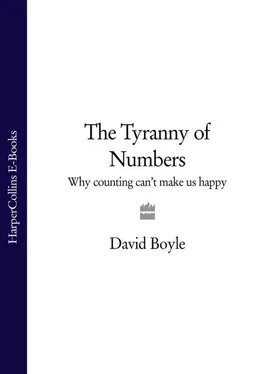If you want to watch people who go further than that – people who try to measure things which can probably never be measured – then come with me for a moment to the closing minutes of a libel action at the Law Courts in the Strand, London. The jury has decided that when a national newspaper described a respectable lady as a prostitute – when she was no such thing – they had clearly ‘lowered her in the estimation of right thinking people,’ which is one legal definition of libel. But what kind of damages should she be given?
The amount awarded is a decision for the jury, and the judge is not allowed to even hint at a figure. He cannot suggest to them that the average pay-out might be £10,000 or £500,000. His half-moon spectacles perched on the end of his nose, he turns to the jury box. ‘Imagine if you will,’ he says, ‘a small flat in Battersea. Or perhaps a semi-detached in Maida Vale. Or maybe a penthouse apartment in Mayfair …’
And so he goes on. Did the humiliation the woman received deserve the flat, the house or the penthouse? Or something else? How could you start to measure such things? But the jury played safe and plumped for the house, and who can say whether they were right or not? ‘If this is justice, I’m a banana,’ said the editor of Private Eye famously with damages of £600,000 awarded against him in the same court. Damages are notoriously difficult to judge, but sometimes you still have to try.
Libel damages are just one example among many. What makes this such a peculiar moment in the history of measurement is that in almost every area of public life, qualities like happiness, competence or loyalty are being picked over by hordes of radical accountants and politicians, visionary entrepreneurs and planners – desperately trying to find ways of being more effective in a competitive world.
Despite the proliferation of measurements, somehow the numbers are still not providing an effective lever. Why? Because, so often, you can’t measure what’s really important. But it’s all very well to say it is impossible: decisions still have to be made – and if you don’t count what’s really important, it gets ignored. It doesn’t count. There are only so many resources, so doctors must compare the quality of life of a 70-year-old with heart failure against a suicidal teenager with a long history of depression. Planners have to compare the pleasure and disruption brought by a new 18-screen cinema with the contentment of keeping the site as a park. Investors have to compare a notoriously polluting oil company with a dodgy record in human rights with a tremendously successful Internet company with three employees and no profits.
It’s impossible of course, but they have to try, because otherwise the wrong decision will be made or their rivals will steal an advantage. So they find themselves isolating something which can be counted. Then they measure, measure, measure, knowing that what they measure is alive and will not keep still, and suspecting that maybe – however much they count – they will not capture the essence of the question they are asking. Things have to keep static if you’re going to count them: that’s probably why the first statisticians were known as ‘statists’. But real life isn’t still.
How, for example, can businesses measure what they are worth, when value is increasingly ephemeral – encompassing things which go way beyond traditional balance sheets? How can we measure our national or local success when our measuring rods are so inadequate, and yet so important to our politicians? Yet without measuring rods, it is hard to know whether we are making any progress.
But if politicians have a difficult time, it is nothing to what is happening in the business world, as managers struggle to find ways of measuring customer loyalty, brand reputation or staff morale. And as they do so, Internet companies which have never made a profit and which sell intangible products, rush past them up the Wall Street indices. When the balance sheets of a company like Microsoft show assets worth only 6 per cent of its stock market value, they need to find an answer.
It’s all a bit like a computer game. What really matters can’t be counted, but it’s a much worse situation than that. If you make the attempt but measure the wrong thing, it isn’t just wasted effort. It can destroy everything you’ve worked for. Like the school league tables that make teachers concentrate on getting borderline pupils through at the expense of their weaker classmates. Or the hospital waiting lists that fell because only quick simple problems were treated. It’s a familiar story, just as unemployment statistics bear no relation to the number of people who actually want to work. It all comes down to definitions: governments prefer to count people claiming benefits rather than unemployed people. To count things, you first have to define them in measurable ways, and magically the system can manipulate the figures by narrowing the definition.
This amounts to a kind of crisis. We need answers, but we also know that what is most important to our lives simply can’t be pinned down like a still life. We can’t measure happiness directly, any more than we can measure God or measure life, but we can measure some of its symptoms, and some of the symptoms of its absence. Which is why a city like Seattle started measuring success by the number of vegetarian restaurants, or why Strathclyde started measuring success by the number of golden eagles. It is why schools are trying to measure their pupils’ self-esteem, why investors are measuring the ethics of their investments – and why companies like Toys Я Us and Shell are pouring resources into measuring the knowledge and contentment of staff, communities and stakeholders.
A century and a half ago, the followers of the philosopher Jeremy Bentham were dashing around the country in their stagecoaches to measure everything they possibly could – from the health of slum inhabitants to the religious feelings of children – coming home with tables of figures with which to challenge the world. Now there is a new generation of iconoclasts who are determined to solve the measurement problem. You don’t see them at work. They are safely behind their calculators or drawing up tables of comparison in just the same way. This book is about them, because – like scientists reaching into the unknown – they may change our lives for ever.
What we can’t do is leave things as they are – all of those numbers are making us misunderstand things. They make us ignorant of the world past the ends of our noses, measuring things means defining them and reducing them. Still life is dead life. In fact, in Italian, still life is ‘natura morta’. We lose some of the magic in it. Every time a new set of statistics comes out, I can’t help feeling that some of the richness and mystery of life gets extinguished. Just as individual stories of passion and betrayal get hidden by the marriage statistics, or the whole meaning of the Holocaust gets lost in the number 6,000,000. There is a sort of deadening effect, a distancing from human emotion and reality. Not much, but just enough for it to matter – like Jedediah Buxton trying to understand Shakespeare’s masterpieces by counting the words.
Magic is about breaking out of categories, words and definitions, and I should declare an interest – I want a bit more of it. Measuring things takes away the childish sense of wonder where things are really possible. A serious-looking man with a white coat and clipboard – one of those disinterested people who counts a lot but feels little – will have to put me right, and tell me off for filling people’s minds with airy-fairy nonsense.
Читать дальше












